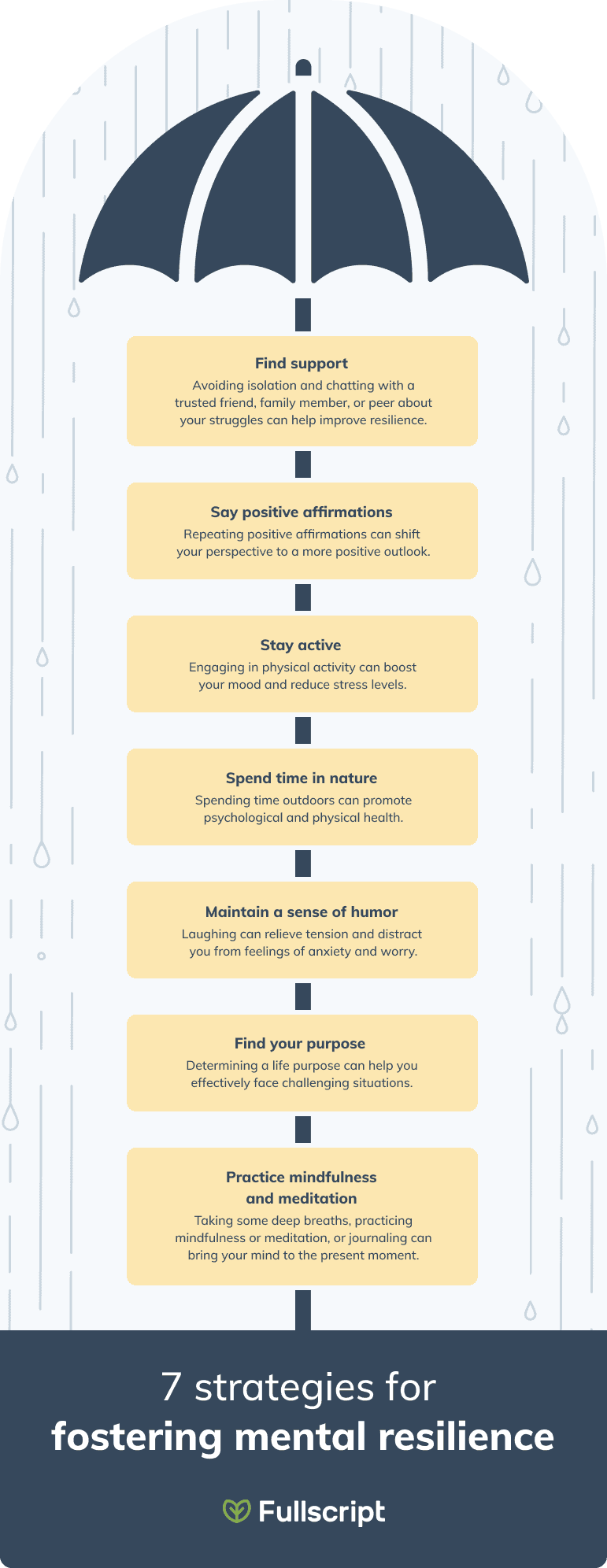
Mental resilience describes how one responds and adapts to life’s challenges.
What is mental resilience?
According to the American Psychological Society, resilience is the “process of adapting well in the face of adversity, trauma, tragedy, threats or significant sources of stress—such as family and relationship problems, serious health problems or workplace and financial stressors.” Put simply, it means “bouncing back from difficult experiences.” (1) It should come as no surprise that everyone has their own unique experiences and hardships, but how one responds to life’s challenges is what determines their resilience. A common misconception about resilience is that in order to be resilient in the face of a challenging or traumatic situation, you must “tough it out” or “put on a brave face.” In reality, resilience is a set of behaviors, thoughts, and actions in response to a stressor or trauma that anyone can learn. Gaining mental resilience takes time and involves a combination of employing your internal strengths and utilizing external tools and resources. (1)Why are some individuals more resilient than others?
How you respond to stressful situations may not always be in your control. In fact, your genes and developmental environment may play a significant role in your resilience.1. Genetics
Genetics has been shown to play a significant role in how you respond to stress and trauma. For example, individuals with the COMT Val158Met polymorphism may have lower mental resilience and be more susceptible to post-traumatic stress disorder (PTSD). (19)2. Developmental environment
Exposure to trauma during childhood has been shown to exert long-lasting changes in the central nervous system circuits, contributing to mood disorders, feelings of helplessness, and increased vulnerability to chronic stress during adulthood. (19)What is mental resilience training?
Although there is no universal definition or standard curriculum for mental resilience training (MRT) programs, they typically involve a set of interventions intended to enhance resilience in an individual or group setting. (12) Common interventions used in MRT involve cognitive-behavioral and mindfulness-based practices. (15)Benefits of mental resilience training
Mental resilience training has been shown to reduce symptoms of anxiety and depression, enhance coping skills, prevent workplace burnout, and promote longevity.1. May protect you from mental health conditions
A 2015 study of 40 working healthcare professionals investigated the effects of an eight-week mindfulness-based resilience training program that combined elements of mindfulness meditation, exercise, and nutrition. Participants in the program experienced a 63 to 70% reduction in depression, a 48% reduction in stress, and a 23% reduction in anxiety immediately following and for up to two months after the conclusion of the trial. (11) A meta-analysis investigating the benefits of resilience training in children noted improvements in depressive symptoms even one year post intervention. (3)2. Improves coping skills
Most MRT programs introduce strategies for establishing healthy coping skills. Having adequate coping skills can help you appropriately respond to stressors. In one study, prior to a MRT intervention, participants described their stressors as problems outside of their control, which affected their confidence and led them to feel frustrated. After MRT, participants reported a shift in how they perceived their stressors. They began to see their challenges as normal or expected, giving them cognitive control and improved self-awareness and self-efficacy. (7) A systematic review demonstrated that MRT increases participants’ abilities to cope with everyday stressors and negative events, enhances the development of adaptive coping skills, and decreases issues arising from stressful situations. (9)3. May prevent workplace burnout and improve job satisfaction
Much of the research on the benefits of mental resilience training has been conducted in healthcare workers due to the demanding, and sometimes traumatic, nature of their careers. Many employers have turned to resilience training to help prevent or mitigate the harmful effects of workplace burnout, a psychological syndrome resulting from chronic exposure to workplace stressors. (13) When left unchecked, burnout can lead to feelings of mental and physical exhaustion, cynicism and hopelessness, detachment, low motivation, and low productivity. (13) A 2021 cohort study assessed the effects of the Stress Management and Resiliency Training (SMART) Program on healthcare professionals’ well-being and job satisfaction. Participants in the program reported reductions in stress levels and improvements in global mental health, physical health, and job satisfaction. However, participants did not note improvements in burnout following the completion of the program. This study suggests that resilience training may be an effective tool for reducing stress and improving resilience in the workplace; however, additional interventions may be required for addressing burnout. (8) Another cohort study offering resiliency training to healthcare workers demonstrated statistically significant improvements in resilience, stress and anxiety levels, quality of life, and health behaviors up to three months after the conclusion of the intervention. (18)4. May promote longevity
Resilience among senior citizens and their families has been shown to promote longevity. One study noted that, when controlling for various confounders such as health, individuals aged 94 to 98 with high resilience had a 43.1% greater likelihood of reaching the age of 100 than those of the same age group with lower resilience. The study measured resilience using a series of seven questions such as “Do you often feel lonely and isolated?” and “To whom do you usually talk most frequently in your daily life?” These questions reflected on multiple factors of resilience, including an individual’s optimism, coping mechanisms, and self-control. (20)7 strategies for fostering mental resilience
Active coping, which involves behavioral and/or psychological strategies used to modify the stressor or one’s perception of the stressor, is the most effective strategy and has been shown to enhance adaptability and mental resilience. In contrast, avoidant coping, characterized by participation in activities (e.g., substance use) or mental processes (e.g., behavioral withdrawal) to distract from the stressor, can lead to psychological distress and ongoing adverse reactions to stress. (19) The strategies outlined below are some examples of healthy coping mechanisms.
Practice active coping mechanisms to foster mental resilience.
1. Find support
Seeking positive social support has been shown to improve resilience to stress and may even decrease genetic and environmental vulnerabilities. (14) Avoid isolating yourself and instead share your thoughts and feelings with a trusted friend, family member, or peer. Furthermore, if you’re struggling to cope with challenging or stressful events in your life, speaking to a mental health professional can help.2. Say positive affirmations
Positive affirmations can help you unlearn negative thought patterns and shift your perspective to a more positive outlook. Repeating self-affirmations, such as “I am confident and capable,” has been shown to decrease stress, enhance well-being, and reduce the effect of negative emotions. (5)3. Stay active
Research demonstrates that physical activity can be especially beneficial for individuals facing significant stressors. (19) As a general recommendation, aim for at least 150 minutes of moderate-intensity physical exercise per week. (6)4. Spend time in nature
The simple act of sitting on a park bench or taking a stroll outdoors can have profound effects on your mental well-being and resilience. Research demonstrates that visiting outdoor recreation sites can promote psychological and physical health. (4)5. Maintain a sense of humor
Laughter is a highly effective strategy for relieving stress. Research investigating the benefits of laughter in veterans, terminally ill individuals, and adolescents has shown laughter to be protective against stress. (19) Watch your favorite sitcom, visit a comedy show, or call a friend who makes you laugh.6. Practice mindfulness and meditation
Practice mindfulness by enjoying a meal without distractions, taking a yoga class, or practicing deep breathing exercises. Reflecting in a journal is also an excellent strategy for practicing mindfulness. Try jotting down a few things for which you’re grateful or reflect on some of the positive aspects of your life. (2) Furthemore, meditation may help improve resilience by bringing your mind to the present moment and calming racing thoughts. (10)
Journaling may help improve resilience.
7. Find your purpose
Having a purpose in life not only promotes longevity and general well-being, but it may help you face stressors more productively, enhance emotional recovery skills, and facilitate recovery from challenging events. (16) Find your purpose, such as through volunteering, helping others, caring for a pet, or reaching for a personal life goal. (17)The bottom line
Mental resilience training can help cultivate mental well-being, enhance coping skills, improve job satisfaction, and even promote longevity. By practicing active coping skills like those outlined in this article, you can be on your way to establishing mental resilience. If you or someone you know is struggling with their mental health, speak to a mental health professional for guidance.- American Psychological Association. (2011). Building your resilience. https://www.apaservices.org/practice/good-practice/building-resilience.pdf
- American Psychological Association. (2020). Building your resilience. https://www.apa.org/topics/resilience
- Brunwasser, S. M., Gillham, J. E., & Kim, E. S. (2009). A meta-analytic review of the penn resiliency program’s effect on depressive symptoms. Journal of Consulting and Clinical Psychology, 77(6), 1042–1054.
- Buchecker, M., & Degenhardt, B. (2015). The effects of urban inhabitants’ nearby outdoor recreation on their well-being and their psychological resilience. Journal of Outdoor Recreation and Tourism, 10, 55–62.
- Cascio, C. N., O’Donnell, M. B., Tinney, F. J., Lieberman, M. D., Taylor, S. E., Strecher, V. J., & Falk, E. B. (2015). Self-affirmation activates brain systems associated with self-related processing and reward and is reinforced by future orientation. Social Cognitive and Affective Neuroscience, 11(4), 621–629. https://www.ncbi.nlm.nih.gov/pmc/articles/PMC4814782/
- Centers for Disease Control and Prevention. (2021). Move more; sit less. https://www.cdc.gov/physical-activity-basics/guidelines/adults.html
- Delany, C., Miller, K. J., El-Ansary, D., Remedios, L., Hosseini, A., & McLeod, S. (2015). Replacing stressful challenges with positive coping strategies: A resilience program for clinical placement learning. Advances in Health Sciences Education, 20(5), 1303–1324.
- Dossett, M. L., Needles, E. W., Nittoli, C. E., & Mehta, D. H. (2020). Stress management and resiliency training for healthcare professionals. Journal of Occupational & Environmental Medicine, 63(1), 64–68.
- Fenwick-Smith, A., Dahlberg, E. E., & Thompson, S. C. (2018). Systematic review of resilience-enhancing, universal, primary school-based mental health promotion programs. BMC Psychology, 6(1), 30.
- Hwang, W. J., Lee, T. Y., Lim, K. O., Bae, D., Kwak, S., Park, H. Y., & Kwon, J. S. (2017). The effects of four days of intensive mindfulness meditation training (Templestay program) on resilience to stress: A randomized controlled trial. Psychology, Health & Medicine, 23(5), 497–504.
- Johnson, J. R., Emmons, H. C., Rivard, R. L., Griffin, K. H., & Dusek, J. A. (2015). Resilience training: A pilot study of a Mindfulness-Based program with depressed healthcare professionals. Explore, 11(6), 433–444.
- Leppin, A. L., Bora, P. R., Tilburt, J. C., Gionfriddo, M. R., Zeballos-Palacios, C., Dulohery, M. M., Sood, A., Erwin, P. J., Brito, J. P., Boehmer, K. R., & Montori, V. M. (2014). The efficacy of resiliency training programs: A systematic review and Meta-analysis of randomized trials. PLoS ONE, 9(10), e111420.
- Maslach, C., & Leiter, M. P. (2016). Understanding the burnout experience: Recent research and its implications for psychiatry. World Psychiatry, 15(2), 103–111.
- Ozbay, F., Johnson, D. C., Dimoulas, E., Morgan, C. A., Charney, D., & Southwick, S. (2007). Social support and resilience to stress: from neurobiology to clinical practice. Psychiatry (Edgmont (Pa. : Township)), 4(5), 35–40.
- Precious, D., & Lindsay, A. (2018). Mental resilience training. Journal of the Royal Army Medical Corps, 165(2), 106–108.
- Schaefer, S. M., Morozink Boylan, J., van Reekum, C. M., Lapate, R. C., Norris, C. J., Ryff, C. D., & Davidson, R. J. (2013). Purpose in life predicts better emotional recovery from negative stimuli. PLoS ONE, 8(11), e80329.
- Schippers, M. C., & Ziegler, N. (2019). Life crafting as a way to find purpose and meaning in life. Frontiers in Psychology, 10, 2778.
- Werneburg, B. L., Jenkins, S. M., Friend, J. L., Berkland, B. E., Clark, M. M., Rosedahl, J. K., Preston, H. R., Daniels, D. C., Riley, B. A., Olsen, K. D., & Sood, A. (2018). Improving resiliency in healthcare employees. American Journal of Health Behavior, 42(1), 39–50.
- Wu, G., Feder, A., Cohen, H., Kim, J. J., Calderon, S., Charney, D. S., & Mathé, A. A. (2013). Understanding resilience. Frontiers in Behavioral Neuroscience, 7, 10.
- Zeng, Y., & Shen, K. (2010). Resilience significantly contributes to exceptional longevity. Current Gerontology and Geriatrics Research, 2010, 1–9.





